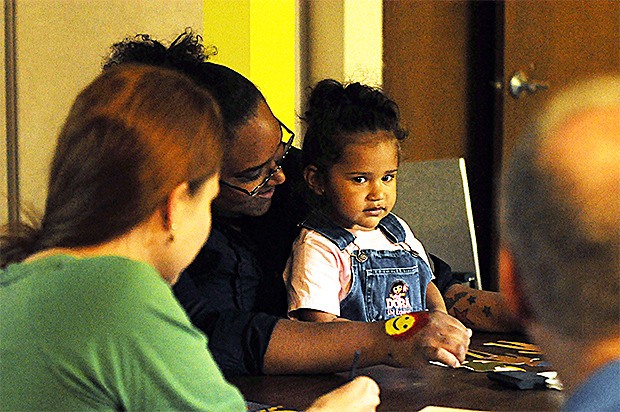MARYSVILLE – Sharleen Desrochers has never had a job, never had an apartment. But she has had a drug problem. And she does have an 18-month-old daughter, Madison.
Desrochers lived a hard life in Oakland, for one week even having to sleep in a car. She decided to get clean, but social services in California were “horrible.” Family in the Everett area told her they would bring her up here for help if she continued to clean up her act.
Desrochers is now living in a women’s and children’s shelter that is fairly new to Marysville.
“Since I got pregnant with her (Madison), this is the nicest place we’ve lived — by far,” she said.
Desrochers said she and her daughter were victims of domestic violence, but many of her problems were brought on by her own “poor choices.”
Desrochers gets a big smile on her face when she talks about soon getting her first apartment, in Monroe, and her first job, either as a housekeeper or in the food industry, “to get my foot in the door.”
Desrochers said it would have been tough to turn her life around without the Maud House in Marysville, a Homeless Prevention Program. A Volunteers of America facility, up to eight moms and their children learn skills there to raise a family.
“This place gets stuff done,” Desrochers said. “They helped me with my mental health, recovery and job skills. They have phenomenal resources.”
Desrochers obviously loves her daughter. “Without her I’d be nothing,” she said.
Nor’vessa White is another tenant there, along with her 11-month-old son King. King’s dad left them right before they were going to be evicted from their previous residence. They stayed with her aunt in Everett for a few days but were facing living on the streets.
“Thank God they called back,” White said of Maud House.
White likes staying there. “We came to be like family,” she said. “We help each other with our kids. There’s also a mutual understanding about personal space.”
But like any family there are issues. “With eight women in one home there are going to be problems,” White said.
White appreciates the resources she receives at Maud House, from helping to find permanent housing to finding a job. White said she wants to be a caregiver. “That’s the best fit for me,” she said.
She said she used to take care of her aunt, who had strokes and seizures, then someone told her, “You can get a job doing that.”
The clients at Maud House get some high-quality instruction to help improve their lives.
For example, Susan Grettsch has a master’s degree in education and is a former director of the Monroe Boys and Girls Club. She is in charge of the VOA child care and learning center.
“We teach them parenting skills and how to play with their kids,” Grettsch said.
The clients also are helped by Katie Prettyman, who teaches them relaxation and meditation techniques.
“We want to help people forgive themselves and others,” Prettyman said. “We also talk about gratitude and guilt and when it’s good to hang on and when to let go.”
Jake Moriarty, VOA communications spokesman, said the nonprofit used to have transitional housing for women in Lynnwood, but decided to move it to Marysville to be closer to services. It’s also a better facility.
“It’s bigger so we can have classes,” Moriarty said, adding they have sessions on life skills, finances, spiritual health, anger management, credit resolution, landlord-tenant issues, work skills, parenting skills and much more.
VOA is funded by grants and donations. It partners with other agencies to provide as many resources as possible at Maud House.
The facility looks like a preschool from the outside, with a busy playground in a secured area and a garden nearby. Inside, clients are taught to “fend for themselves,” case manager Joell Coltrain said. They have their own cabinet space and sections in the refrigerator. There are eight rooms. One has a mom with four children in it. One is for a pregnant woman and has its own bathroom. The other rooms downstairs and upstairs share two bathrooms. Clients pay 30 percent of their income, no matter what it is, so they understand what it’s like to “begin to pay rent,” Coltrain said. There is one common dining area. Once in a while they gather for a potluck, but usually they eat at different times. The women and children can stay there for up to 90 days.
“It’s a place for them to stabilize” until they can find a job and a place to live, with Maud House’s help, Coltrain said.
Clients in the Homeless Prevention Program usually are there for a variety of reasons: economics, housing, Child Protective Services, abuse, mental issues, drugs or alcohol problems, domestic violence, etc.
“It’s usually not one thing,” Coltrain said. “It’s usually a couple of different barriers.”



